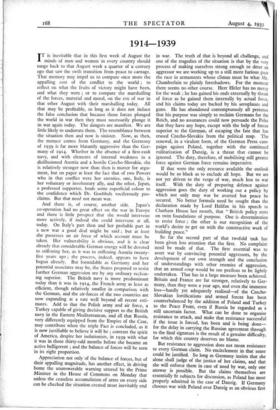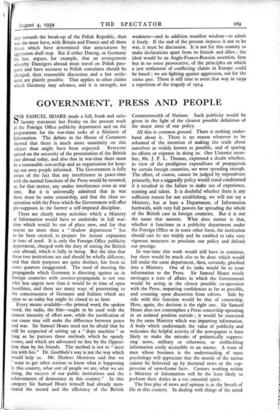1914-1939
IT is inevitable that in this first week of August the
minds of men and women in every country should range back to that August week a quarter of a century ago that saw the swift transition from peace to carnage. That memory may impel us to compute once more the appalling cost of the conflict to the world ; to reflect on what the fruits of victory might have been, and what they were ; or to compare the marshalling of the forces, material and moral, on the eve of war in that other August with their marshalling today. All that may be profitable, so long as it does not induce the false conclusion that because those forces plunged the world in war then they must necessarily plunge it in war again today. The dangers are manifest. We are little likely to underrate them. The resemblance between the situation then and now is sinister. Now, as then, the menace comes from Germany, and the Germany of 1939 is far more blatantly aggressive than the Ger- many of 1914. Whether in the absence of a first-rank navy, and with elements of internal weakness in a disillusioned Austria and a hostile Czecho-Slovakia, she is relatively stronger now than then is matter for argu- ment, but on paper at least the fact that of two Powers who in that conflict were her enemies, one, Italy, is her voluntary or involuntary ally, and the other, Japan, a professed supporter, lends some superficial colour to the confidence which Dr. Goebbels vociferously pro- claims. But that need not mean war.
And there is, of course, another side. Japan's co-operation had no great effect on the war in Europe and there is little prospect that she would intervene more actively, if indeed she could intervene at all, today. On Italy's part then and her probable part in a new war a good deal might be said ; but at least she possesses an air force of which account must be taken. Her vulnerability is obvious, and it is clear already that considerable German energy will be devoted to stiffening her, as it was to stiffening Austria twenty- five years ago ; the process, indeed, appears to have begun already. But formidable as Germany and her potential associates may be, the States prepared to resist further German aggression are by any ordinary reckon- ing superior. The British navy is more predominant today than it was in 1914, the French army as least as efficient, though relatively smaller in comparison with the German, and the air-forces of the two countries are now expanding at a rate well beyond all recent esti- mates. Add to that the Polish army and air force, a Turkey capable of giving decisive support to the British navy in the Eastern Mediterranean, and all that Russia, very differently equipped from the Empire of the Czar, may contribute when the triple Pact is concluded, as it is now justifiable to believe it will be ; contrast the spirit of America, despite her isolationists, in 1939 with what it was in those thirty-odd months before she became an active belligerent ; and the balance of forces will be seen in its right proportion.
Appreciation not only of the balance of forces, but of their appalling magnitude, has another effect, in driving home the unanswerable warning uttered by the Prime Minister in the House of Commons on Monday that unless the ceaseless accumulation of arms on every side can be checked the situation created must inevitably end
in war. The truth of that is beyond all challenge, and one of the tragedies of the situation is that by the very process of making ourselves strong enough to .deter an aggressor we are working up to a still more furious pace the race in armaments whose climax must be what Mr. Chamberlain so plainly foreshadows. For the moment there seems no other course. Herr Hitler has no mercy for the weak ; he has gained his ends externally by threat of force as he gained them internally by actual force, and his claims today are backed by his aeroplanes and guns. He has abandoned contemptuously all pretence that his purpose was simply to reclaim Germans for the Reich, and no assurances could now persuade the Poles that they have any hope, except with the help of forces superior to the German, of escaping the fate that has erased Czecho-Slovakia from the political map. The renewal, in a virulent form, of the German Press cam- paign against Poland, together with the continued militarisation of Danzig, is a threat that cannot be ignored. The duty, therefore, of mobilising still greater force against German force remains imperative.
If that were the only resource available the outlook would be so black as to exclude all hope. But we are not yet driven to the verge of war, much less to war itself. With the duty of preparing defence against aggression goes the duty of working out a policy by which not only may war be averted but peace be secured. No better formula need be sought than the declaration made by Lord Halifax in his speech to Chatham House last month, that " British policy rests on twin foundations of purpose. One is determination to resist force ; the other is our recognition of the world's desire to get on with the constructive work of building peace."
So far the second part of that twofold task has been given less attention that the first. No complaint need be made of that. The first essential was to avert war by convincing potential aggressors, by the development of our own strength and the conclusion of understandings with other enemies of aggression, that an armed coup would be too perilous to be lightly undertaken. That has in a large measure been achieved. Britain and France are far stronger, relatively to Ger- many, than they were a year ago, and even the immense loss—hardly yet adequately realised—of the Czecho- Slovakian fortifications and armed forces has been counterbalanced by the addition of Poland and Turkey to the Peace Front, even if Russia be regarded as a still uncertain factor. What can be done to organise resistance to attack, and make that resistance successful if the issue is forced, has been and is being done— for the delay in carrying the Russian agreement through to the final signature is the result of a genuine difficulty, for which this country deserves no blame.
But resistance to aggression does not mean resistance to every German claim. No encirclement in that sense could be justified. So long as Germany insists that she alone shall judge of the justice of her claims, and that she will enforce them in case of need by war, only one answer is possible. But the claims themselves are essentially fit subjects for discussion, as Poland has most properly admitted in the case of Danzig. If Germany chooses war with Poland over Danzig as an obvious first step towards the break-up of the Polish Republic, then war she must have, with Britain and France and all those States which have determined that annexations by aggression shall stop. But if either Danzig, or Germany for her, argues, for example, that an arrangement whereby Danzigers abroad must travel on Polish pass- ports and have recourse to Polish consulates should be changed, then reasonable discussion and a fair settle- ment are plainly possible. That applies to other claims which Germany may advance, and it is strength, not weakness—and in addition manifest wisdom—to admit it freely. If the end of the present impasse is not to be war, it must be discussion. It is not for this country to make declarations apart from its friends and allies ; the ideal would be an Anglo-Franco-Russian assertion, firm but in no sense provocative, of the principles on which a just settlement of conflicting claims in Europe could be based ; we are fighting against aggression, not for the status quo. There is still time to avert that way in 1939 a repetition of the tragedy of 1914.









































 Previous page
Previous page